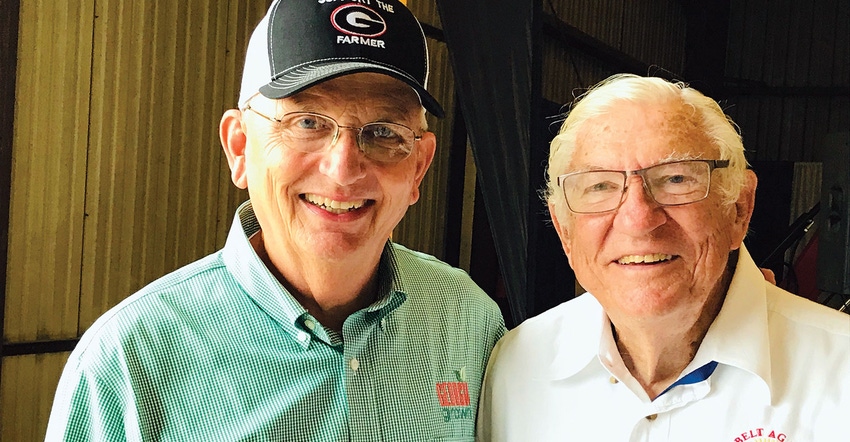
Gale Buchanan understands agriculture from the ground up. Through his many years of service, he’s witnessed how weather, technology and policy affect farmers.
And, despite the current downturn in farm profitability, Buchanan remains optimistic about agriculture. He’s observed enough to appreciate both the challenges and the opportunities.
He grew up on a farm in Florida, has been a professor, director of the Agricultural Experiment Station at Auburn University, director of the University of Georgia Coastal Plains Experiment Station, director of the UGA Experiment Station and dean of the University of Georgia College of Agricultural and Environmental Sciences.
After he retired from the university, Buchanan served in the USDA as undersecretary of agriculture for Research, Education and Economics.
He’s also served on the board of directors of the Sunbelt Ag Expo. In retirement, he’s authored three books and is working on others.
On a personal note, Buchanan was one of the first agricultural scientists I interviewed as a fledgling staff writer for Southeast Farm Press, back in 1978.
So, it was a distinct pleasure and a rare opportunity to meet up with Buchanan at this year’s Sunbelt Ag Expo in Moultrie, Ga. He was kind enough to reminisce on the changes he’s seen in his long career and to comment on what the future looks like for U.S. farmers.
Farm Press: Gale, you have seen amazing changes in agriculture during your career. What are some of the biggest and most important?
Buchanan: Well obviously, the explosion of technology. In fact, just walking through the Expo today, I didn’t even recognize the brand name of tractors on the market. So, there’s been tremendous increase in all kinds of technology and it’s not just in equipment but we’re seeing an increase in use of technology in almost every aspect of agriculture.
Farm Press: Gale, the first time I met you was in a peanut field near Eufaula, Ala., during a weed tour. Talk a little bit about how weed control has changed since 1978.
Buchanan: Well, I go back to the early days of herbicides when they were rather inconsistent. They depended upon the vagaries of the weather. They worked sometimes, sometimes they didn’t. But over the years, they’ve become much, much more consistent. And the development of Roundup technology by the Monsanto Company a few years ago added another level to herbicide consistency.
I think we’re going to continue to see improvements in how we deal with all kinds of pests, not just weeds but all other pests. We still have many opportunities. We have a lot of pests we can’t control yet, though. For example, in oranges, citrus greening is a serious problem and there are many others I can cite.
Farm Press: I sat in a conference yesterday with some of the best farmers in the industry, the 10 finalists for the Swisher Sweet Sunbelt Expo Southeast Farmer of the Year. And one of the things I got out of that was a sense of optimism, even with the challenges they face. Where do you think that attitude comes from?
Buchanan: It comes from the innate nature of farmers. I was raised on a farm and I clearly understand that you have to be an optimist to be a farmer. That hasn’t changed at all. And I think there are reasons for optimism. First, there is a market for what we produce. There’s not a single human being on this planet that can avoid eating if they want to live. So, there is a market for what we produce. From that perspective, we don’t have to worry about running out of opportunities, but also, we see the increase in information, knowledge and technology through our research programs delivered through Extension. And that’s not going to change. So, there are reasons for optimism. I can understand that. I’d be disappointed if they didn’t have optimism.
Farm Press: How about young people? Do they have bright futures in agriculture?
Buchanan: Absolutely. It’s a challenge because it’s so expensive. I mean, when I was a young man, a tractor for $20,000 was unheard of. And now that’s the starting price for a little one. If you are talking about a big tractor, you have to start talking in much, much bigger figures. So, the cost of getting into farming has changed dramatically and will probably continue to change.
Farm Press: We also need different skills in farming than was the case 40 years ago. How has that changed, Gale? Has technology made a difference?
Buchanan: Absolutely. The use of computers affects every aspect of our lives. And the farmer has to be, not only a good farmer, but also a good businessman, a good economist as well as a manager of all of the aspects that it takes to be successful.
Farm Press: You and I would agree on the love we feel for this industry. Can you touch on that?
Buchanan: I have spent my entire life in agriculture, first on the farm and then as a student of agriculture and then as a researcher and administrator, and now I’m working on books or writing about agriculture. I have been in agriculture all my life and it’s been a great life.
Editor’s Note: Gale Buchanan has authored three books: Feeding the World: Agricultural Research in the Twenty First Century; Branch Research Stations in Agriculture: History, Development, Operation, and Future; and Leadership in Agriculture: Case Studies for a New Generation (Texas A&M AgriLife Research and Extension Service Series) co-authored with John Patrick Jordan, Neville P. Clarke, and Kelly C. Jordan.
About the Author(s)
You May Also Like






